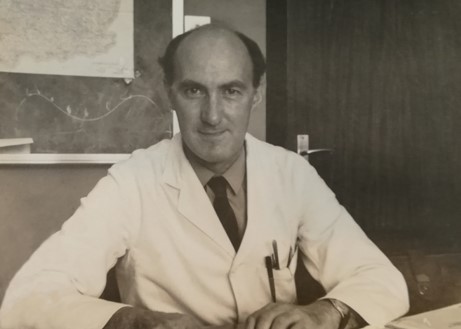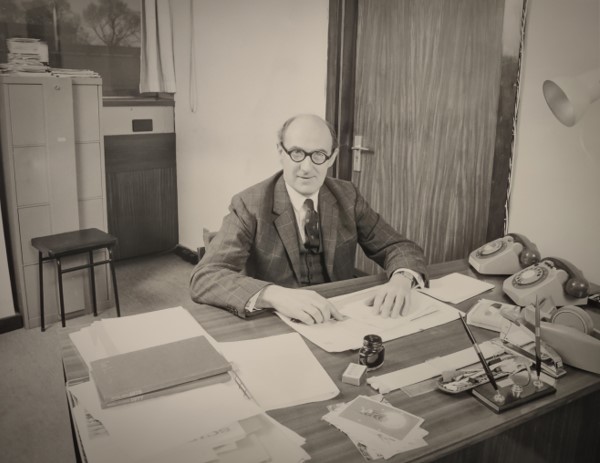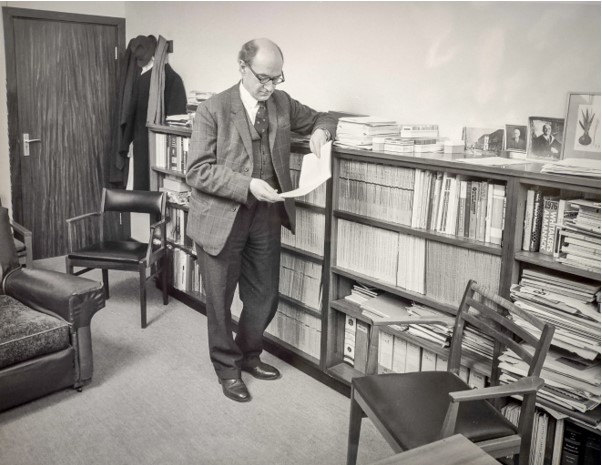About the University of Leicester
Emeritus Professor Ron Whittam FRS
 The University has learned, with sadness, of the death of Emeritus Professor Ronald Whittam FRS.
The University has learned, with sadness, of the death of Emeritus Professor Ronald Whittam FRS.
Born in Lancashire on 21 March 1925, Ron Whittam left school at 14 to work in his parents’ bakery, though he continued his education with evening classes in science at a local college. He joined the RAF in 1943 when he turned 18. After demob in 1947 he began his academic life, graduating with a BSc in Chemistry from the University of Manchester in 1951.
After graduation, he was personally selected by Hans Krebs to join a Medical Research Council unit at the University of Sheffield, where he gained his first PhD. In 1955, after receiving a John Stokes Fellowship, he moved to Cambridge where he gained a second doctorate. His colleagues in Cambridge included two future University of Leicester Chancellors, Edgar Adrian (1957-1971) and Alan Hodgkin (1971-1984).
Whittam was at Oxford from 1958 to 1966, again working with Hans Krebs (by then a Nobel Laureate), and was appointed lecturer in 1960. This period included spells working at Columbia University, New York – where he did important research using electric eels – and the Weizmann Institute of Science in Israel.

In 1966 Ronald Whittam was appointed to a Chair in General Physiology at the University of Leicester. He founded the Laboratory of Physiology at the University, which became the Department of Physiology in 1968. He quickly established a vibrant department through the appointment of some outstanding young physiologists (notably Asa Blakeley, Peter Stanfield, Nick Standen and others), establishing Leicester as a centre for physiological research in a remarkably short time.
Throughout this time he continued his ground-breaking research on how and why ions (in particular sodium and potassium) are asymmetrically distributed across biological membranes and the role played by the sodium pump (also known as the sodium, potassium ATPase). He was made a Fellow of the Royal Society in 1973 for his seminal contributions to our understanding of cell physiology. His research contribution was summarised as follows: “Ronald Whittam conducted important studies of the mechanism of active transport of ions in animal tissues. He demonstrated the special asymmetry of the ATPase of the red blood cell membrane, which acts only when sodium ion is inside and potassium ion is outside the membrane. He was the first to demonstrate that active transport can exert a feedback control over the rate of cellular metabolism. These concepts, of directionality as an inherent part of an enzyme reaction in membranes, are of fundamental significance for the understanding of the relations between physiological function and the mechanism of enzyme action”.

In addition to establishing (from scratch) a centre of research excellence in physiology, Ron Whittam also made many other contributions to the University of Leicester. He was part of the team of senior staff who advocated for and established the Medical School at Leicester, and fulfilled the role of Dean of the Faculty of Science for a number of years. Ronald Whittam retired from the University in 1983, becoming Professor Emeritus. He continued to live in the city and to be an active supporter of the University, regularly attending formal (Court) and less formal events.
At various times during his career, Ron Whittam served on the Editorial Board of the Biochemical Journal, the Biological Research Board of the Medical Research Council, the Biological Education Committee of the Royal Society and Institute of Biology, the Biological Sciences Committee of the University Grants Committee, and the Education Committee of the Royal Society. He was Honorary Secretary of the Physiological Society 1969-1974, being made an Honorary Member of the Society in 1986.
Ronald Whittam passed away peacefully on 16 August 2023 in Leicester Royal Infirmary, aged 98. He is survived by Christine, whom he married in 1957, son Harvey, daughter Althea and four grandchildren. He was a keen mountaineer in his youth and his love of the outdoors continued into his nineties. The University extends our sincerest condolences to Professor Whittam’s family, friends and colleagues.
Professor John Challiss, Head of the Department of Molecular and Cell Biology, writes:
“Emeritus Professor Ron Whittam was both an eminent scientist and an architect of how the University established its footprint, and very quickly its reputation, in the Sciences in the 1960s and 1970s. Ron saw both the Adrian Building and Medical School (now the Maurice Shock Building) added to our campus. He, along with other pioneers, such as Professor Sir Hans Kornberg and Professor Ken Pounds, oversaw the growth of the University towards being a truly research-intensive institution. We should all acknowledge the massive contributions leaders like Ronald Whittam made to our university.”